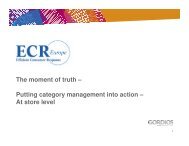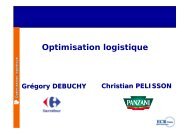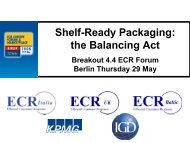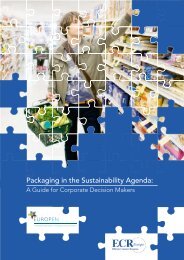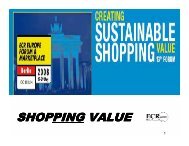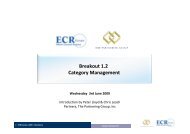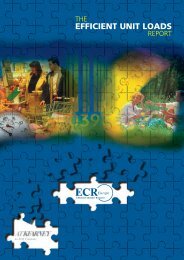ECR AP - The need for collaboration - ECR Community
ECR AP - The need for collaboration - ECR Community
ECR AP - The need for collaboration - ECR Community
You also want an ePaper? Increase the reach of your titles
YUMPU automatically turns print PDFs into web optimized ePapers that Google loves.
Joint Keynote Address<br />
Collaboration between manufacturers<br />
and retailers to touch<br />
lives and improve value<br />
HARISH MANWANI, COO, UNILEVER SCOTT PRICE, PRESIDENT AND CEO, WALMART ASIA<br />
Scott Price: I like the theme of this year’s conference – Touching<br />
lives, Improving value. Because whether retailer or manufacturer,<br />
that is ultimately the purpose of what we do. We touch people’s<br />
lives.<br />
Given challenges the world faces today – of exploding population,<br />
higher consumption, unemployment etc. no one company<br />
or organization can create change all by itself. We have to collaborate<br />
with each other where possible to amplify the manner in<br />
which we can touch and improve the lives of our customers and<br />
consumers.<br />
We thought it would be appropriate to share with you four key<br />
areas where our working together can be very productive. <strong>The</strong>se<br />
areas are:<br />
Products, Consumer Value, People and Planet<br />
Examples we share are primarily examples from Walmart and<br />
Unilever, but we hope this provokes fresh thoughts on how to<br />
better collaborate and leverage the <strong>ECR</strong> Asia Pacific association<br />
<strong>for</strong> us to make even greater impact both as individual companies<br />
and as an Industry.<br />
Harish Manwani: PRODUCT<br />
Unilever was founded over 100 years ago in 1885, when William<br />
Hesketh Lever launched the world’s first branded and packaged<br />
laundry soap, called Sunlight. In doing so he created not just one<br />
of the world’s first consumer brands, but also a company with<br />
strong social values with a mission to have our brands act as an<br />
agent of social change. He also set out a vision <strong>for</strong> his new company<br />
: It was:<br />
… to make cleanliness commonplace, to lessen work <strong>for</strong> women,<br />
to foster health and contribute to personal attractiveness,<br />
that life may be enjoyable and rewarding <strong>for</strong> the people who<br />
use our products.<br />
All this from a bar of soap.<br />
That mission has not changed to this day and I’ll come on to that<br />
in a moment. Everyday products that we make and our business<br />
practices are more important than ever in helping tackle some of<br />
the big issues we face as a global community .<br />
<strong>The</strong><br />
world<br />
<strong>need</strong>s<br />
growth<br />
By<br />
2020,<br />
there<br />
will be<br />
7.6 bn<br />
people<br />
in the world. 1.8 bn consumers will move up to the socioeconomic<br />
ladder, but there will still be 2bn consumers at the bottom<br />
of the pyramid. Many people across the world today still lack<br />
access to basic everyday <strong>need</strong>s such as clean drinking water, good<br />
nutrition and basic hygiene. Simple products like soup, shampoo,<br />
tea can provide a better quality of life that these consumers deserve.<br />
This is an opportunity to improve everyday lives of billions,<br />
and at the same time it is an attractive business proposition.<br />
However, growth at this scale is not without its consequences.<br />
We <strong>need</strong> to grow differently We are today consuming resources<br />
at a rate greater than the earth’s ability to replenish them. If the<br />
whole world consumed at the rate that Europe does, we would<br />
<strong>need</strong> two more planets. If we consumed at the rate of the US, we<br />
would <strong>need</strong> five.<br />
But we cannot wish away consumption. We cannot deny billions<br />
of people the opportunity to improve the quality of their lives.<br />
However, our shared vision has to be to create a future in which<br />
people improve the quality of their lives without increasing their<br />
environmental impact. Hence we <strong>need</strong> to grow differently. We<br />
<strong>need</strong> to find a way to grow within the limited resources of one<br />
planet.<br />
No. 1 in Dow Jones sustainability Index <strong>for</strong> 14 years consecutively<br />
Last year, we set a new vision <strong>for</strong> Unilever, it’s expressed<br />
through our Unilever Sustainable Living Plan, which just a few<br />
weeks ago celebrated its first anniversary and published an inaugural<br />
annual report.<br />
Our vision is to double our business while reducing our environmental<br />
impact and increasing our positive social impact. We<br />
strongly believe that our brands and the way we do the business<br />
has to be at the heart of the social change that we wish to see<br />
around us.<br />
Three key features distinguish the plan<br />
First, it covers all our activities. It spans our entire portfolio of<br />
brands and all 170 countries in which we sell our products.<br />
Second, when it comes to the environment, the plan covers not<br />
just the direct impacts of our factories, offices, lorries and laboratories.<br />
It accepts that Unilever has a responsibility across the<br />
lifecycle – from the sourcing of raw materials all the way through<br />
to the energy and water <strong>need</strong>ed by people to cook, clean and wash<br />
with our products. We have reviewed our overall value chain so<br />
see how we can achieve sustainability end-to-end across the value<br />
chain. This analysis shows that our own impacts are small. 68%<br />
of environmental impact is through people who use our brands.<br />
This means we have to design products which allow consumers to<br />
get the results they want with less energy and water. Changing<br />
consumer behavior can make a big difference to global environmental<br />
agenda.<br />
20<br />
20



